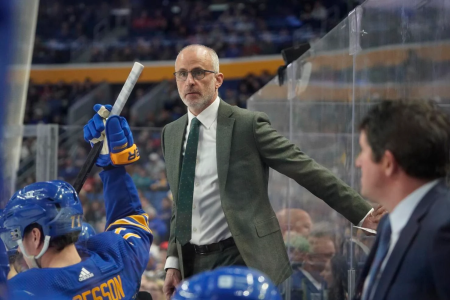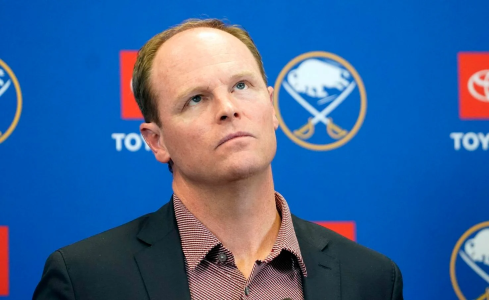
GM Kevyn Adams has his sights set on an experienced coach to lead the Sabres
The next coach of the Sabres will be the eighth behind Buffalo’s bench since Pegula purchased the franchise in February 2011. While Adams wasn’t willing to mention any specific names – sorry, Lindy Ruff supporters – he revealed that he’s looking for someone with NHL experience and planned to...
Kevyn Adams never thought the timing was right to make a coaching change during the Buffalo Sabres’ season.
Even though the general manager was often troubled by what he saw from his seat in the press box, Adams wanted to give the only coach he’s hired, Don Granato, as much runway as possible to try to coax more out of a team that was within one win of qualifying for the Stanley Cup Playoffs last season.
The issues that plagued the Sabres all season reared their ugly head during their must-win games in the final weeks, though. They had too many bad first periods, not enough power-play goals and never looked like the offensive juggernaut that ranked third in the NHL in goals scored while compiling 91 standings points in 2022-23.

The Buffalo Sabres fired head coach Don Granato on Tuesday after he and the team failed to meet expectations in 2023-24 while the franchise’s playoff drought reached 13 seasons. Harry Scull Jr., Buffalo News
As Granato tried to lead the Sabres to a strong finish, Adams began to deliberate. He spoke to people around him in hockey operations, as well as owner Terry Pegula. And, though there were some signs of growth during the second half of the season, Adams ultimately decided that another voice was needed.
Granato was fired Tuesday morning, along with assistant coach Jason Christie and video coordinator Matt Smith. The Sabres chose to retain assistant coaches Marty Wilford and Matt Ellis, the latter won’t lead the power play next season. Goalie coach Mike Bales also will be back next season after he guided Ukko-Pekka Luukkonen through a breakout performance.
“We just didn’t play well enough,” Adams said during a press conference Tuesday afternoon in KeyBank Center. “Period. We did not play well enough. From Day 1 of training camp, I don’t think we had our standard high enough. Our expectations inside the room need to be raised and there needs to be accountability across the board, and that starts with me. I take responsibility for this.”
The next coach of the Sabres will be the eighth behind Buffalo’s bench since Pegula purchased the franchise in February 2011. Seth Appert's success with the Rochester Americans may not be a candidate, though. Adams said "experience" as an NHL head coach will be a requirement.
"I want the next head coach to be someone that has experience and can push this group to the next level," said Adams. "And win hockey games. And I think that’s – I have it in my mind exactly what I’m looking for and that’ll be starting today."
Even though the Sabres were the youngest team in the NHL, Adams thought they should have achieved far more than their 39-37-6 finish that caused their playoff drought to reach 13 years. They allowed a league-worst 97 goals in the first period, their power play dropped from ninth to 28th and, most troubling, they never seemed to have a clear identity on the ice.
The Sabres didn’t have the same prolific offense as last season, nor did they improve enough defensively to account for the troubling trends that Adams saw when they had the puck. They had five players produce 20 or more goals, led by Tage Thompson’s 29, but Rasmus Dahlin and Alex Tuch led the team with only 59 points.

Sabres General Manager Kevyn Adams meets with the media at KeyBank Center after head coach Don Granato was fired Tuesday. Harry Scull Jr., Buffalo News
Granato played a pivotal role in elevating the Sabres from perpetual rebuild to playoff contender. His decision to move Thompson from wing to center changed the franchise’s trajectory at a time when it seemed destined for another long, painful run of losing after Adams traded Jack Eichel, Sam Reinhart and Rasmus Ristolainen in a span of four months.
Several players achieved career highs under Granato, including Tuch, and some parlayed those performances into long-term contract extensions. Adams is unwavering in his belief that the core of Thompson, Tuch, Dahlin, Owen Power and Dylan Cozens are going to be the group to lead the Sabres back to prominence. It became evident to Adams throughout the season, though, that a different approach was needed because they’re ready for someone to be firm and demanding.
“We are craving accountability, structure and that our team’s now, mentally, in my opinion, ready for that, mature enough to handle that push,” said Adams. “But make no mistake, that it’s a lot different than it was a long time ago where you could just really, really slam the door and kick garbage cans and stuff like that. It’s different, so there has to be a blend. You have to be able to communicate, you have to be able to more than ever one-on-one with players, articulate as a coach exactly what the expectations are when you step on that ice but also build a relationship. The players now, and I think this has happened over the last few years, they want a relationship.”
Granato unlocked some of the unrealized talent on the Sabres’ roster by throwing away previous coach Ralph Krueger’s style of play that limited their effectiveness on breakouts and prevented highly skilled players like Dahlin from making an impact with the puck. Young players weren’t benched for mistakes in games, a strategy Granato used to try to get them to be fearless on the ice. They were too loose with their approach for so long, though, that the Sabres couldn’t repeat the details needed for an NHL team to win consistently, particularly one that had so many players in prominent roles that hadn’t experienced the Stanley Cup Playoffs.
There was an obvious change from Granato this season. He moved Thompson to the fourth line during a game in the first half when the 6-foot-6 center had a challenging night. Connor Clifton was a healthy scratch in November only a few months after he signed a three-year contract to join Granato in Buffalo. Erik Johnson, one of the Sabres’ free-agent additions, sat the second and third periods in Florida. It was Johnson’s last game with Buffalo, as he was traded to the Philadelphia Flyers a few weeks later.
The problems began in training camp, though. Granato’s approach to those on-ice sessions, particularly how he structured the practices and built the lines, did not look like a coach pushing a sense of urgency on his players. The Sabres played at a 73-point pace between Oct. 12 and Dec. 31, then a 93-point pace after Jan. 1. There were too many troubling trends for Adams to overvalue the flashes of progress that the team showed during the second half of the season. The frequency of practices, or lack thereof, bothered him. Granato relied too much on data from sports science when, according to Adams, an NHL coach also needs to have a feel for when players need to be on the ice.
“You have to have that willingness to compete and then the skill comes out,” said Adams. “And I think sometimes this year, what I saw was, we’re going to show how skilled we are and that was the leap. And I just think we had it sometimes out of order. … It’s the players making that choice and it’s the coach and the coaching staff, being on that every day, every single day. And knowing it’s a long season, and I understand sometimes you can really, really push guys and sometimes you have to pull back, but that’s feel that’s what I’m talking about with an experienced coach in terms of what I’m looking for someone that has that. All the data is great. All the science is great. But sometimes you have to have that feel, too, and that’s something that I think is important.”
There were times this season when Granato seemed to have the Sabres ready to take another step. They won challenging games on the road, most recently the season-ending win over Tampa Bay, and shut down opponent’s top players. Buffalo went 9-3 in its final 12 games at KeyBank Center and wasn’t eliminated from playoff contention until Game 79 with a loss in Dallas. The penalty kill improved from 28th to 13th under Wilford, and some players made significant improvement from the previous season, particularly Luukkonen and JJ Peterka. Even 18-year-old winger Zach Benson managed to score 11 goals and produce 30 points under challenging circumstances.
The Sabres didn’t take a significant step back in 5-on-5 scoring – they were tied for 10th entering Tuesday after finishing third in 2022-23 – but all of Adams’ concerns outweighed the marginal gains given how quickly the expectations changed. The fan base won’t tolerate another spring without playoff hockey in Buffalo and neither will Pegula.
Adams planned to address the players Wednesday prior to their exit interviews. He wants to emphasize the need for accountability and explain the reasoning behind the coaching change. Some had to see it coming, even though they’ve stressed in recent weeks that the disappointing season was their fault, not the coach’s. Tuch mentioned to reporters following the win Monday night that he expects a much more competitive training camp in the fall. Several minutes later, Granato declined to say whether he was given any assurance that he’d return next season.
Before the players part ways for the summer, they’ll hear a simple message from Adams.
“The time is now,” he said. “I think coming into this year there was still, ‘Where do we fit within the league?’ And with some of our players, ‘Where do I fit in the lineup?’ And what is this going to be? It’s go time. It’s time to perform on an individual level and a team level. We have to be better.”
